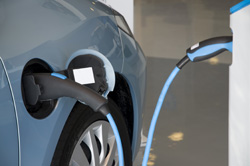Optimised ultracaps for tomorrow’s electric cars
Until recently, even the best capacitors were no match for batteries in terms of the amount of energy stored and as such their usefulness in applications such as hybrid or fuel cell cars was limited. Thankfully, a new generation of capacitors, the ultracaps, has levelled the playing field by tremendously enhancing energy storage and opening the range of applications for the capacitor. Now, in addition to providing backup power for microcomputers and cell phones, ultracaps have found a home in some mass transit vehicles and industrial machines. Perhaps the most exciting potential for ultracaps lies in their use in electric cars. The ‘Hybrid high energy electrical storage’ (Hyheels) project was developed to optimise an ultracap energy storage and delivery system with respect to thermal behaviour, weight and cost for use in hybrid and fuel cell vehicles. In order to be useful in electric cars, several capacitors must work together to supply the required total voltage. As a result, the functioning must be carefully controlled and modulated such that the capacitor charge is balanced to prevent voltage drift. Hyheels researchers developed a new cell stack technology together with a controller to ensure reliable operation of the module for all current and future automotive applications, thus overcoming the voltage drift issues of current systems. In addition, they developed novel simulation models to facilitate the design of ultracap modules for various vehicle configurations. The operation was tested and validated on passenger cars and heavy duty vehicles demonstrating minimisation of voltage variation and power losses. In a life-cycle analysis (LCA) ultracaps scored better than all assessed batteries with respect to environmental impact primarily due to low weight and high materials recyclability. Hyheels has significantly advanced the technology required for widespread application of ultracaps in electric vehicles. Commercial implementation of the concepts has the potential to position the European economy in a leadership role in the electric vehicle market. Such advances are poised to revolutionise individual and mass transport, with important benefits for consumers, industry and the planet.







